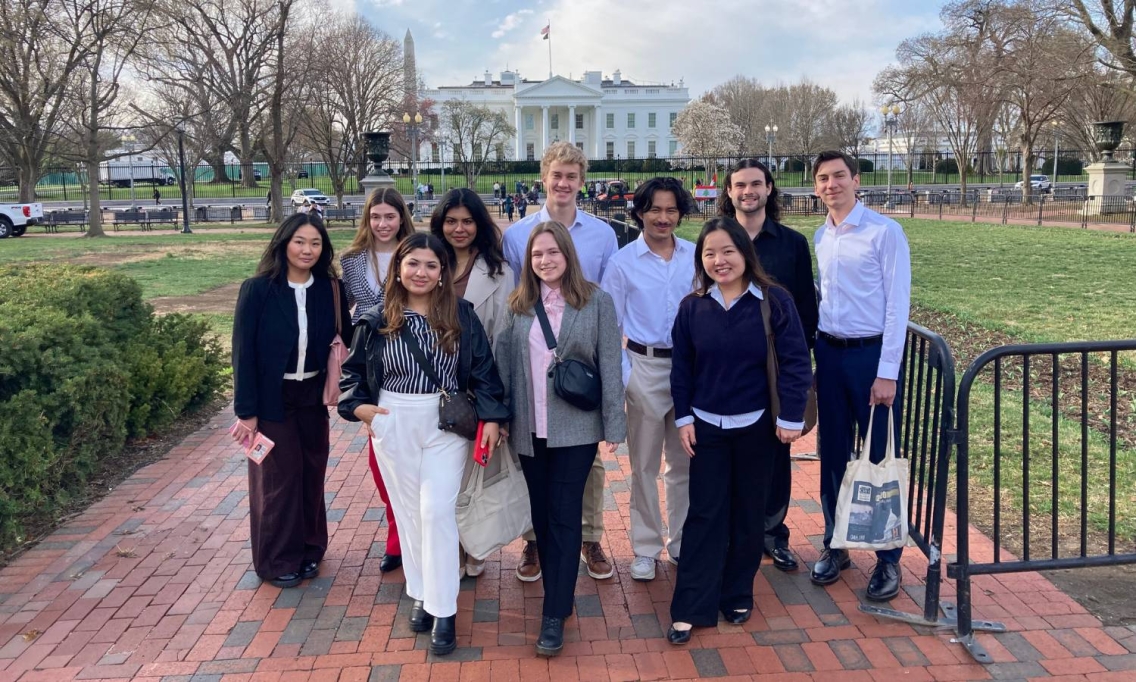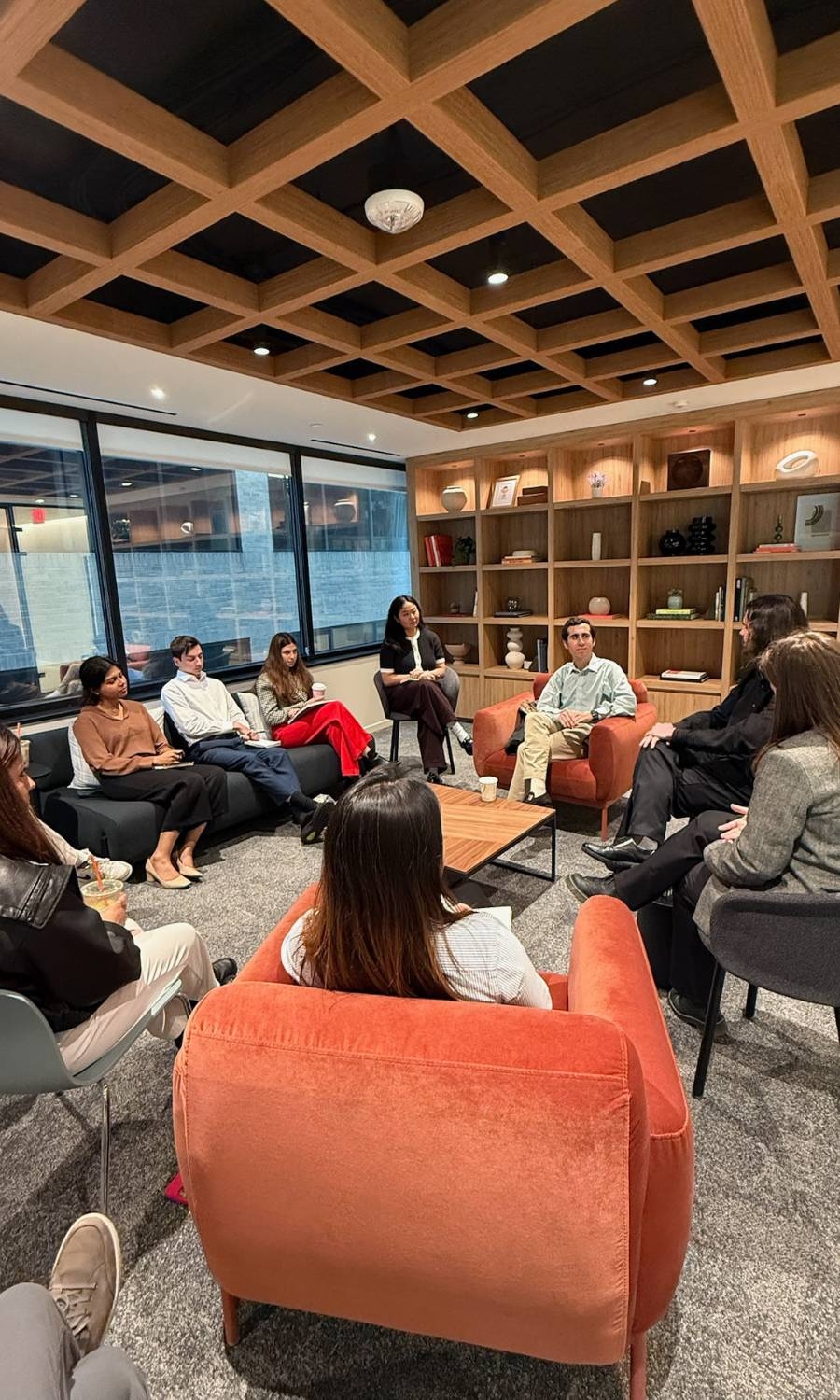Middlebury Students Explore Careers in Global Affairs and Conflict Transformation on DC Trek.
Arts, Media, and Communications, Business, Finance, and Consulting, Education, Government, Law, and Policy, Social Impact, Technology

Over spring break, ten Middlebury students embarked on the Global Affairs and Conflict Transformation Student Trek to Washington, D.C. Organized by the Center for Careers and Internships (CCI) and Middlebury in DC, and funded by the Kathryn Wasserman David Collaborative in Conflict Transformation, this fully funded experience provided Rohatyn Global Scholars and Fellows with the opportunity to engage with alumni and professionals tackling some of the world’s most pressing global challenges.
The trek aimed to offer a career exploration experience, connecting students with a diverse array of employers and alumni working on complex global issues. Through these interactions, students deepened their understanding of conflict at individual, community, and global scales while learning about innovative strategies for addressing societal divisions.
From March 16 to March 21, students followed a carefully curated itinerary designed to introduce them to career paths in global affairs, international finance, policymaking, and conflict transformation. Site visits and reflection dinners with Middlebury alumni allowed participants to explore potential career opportunities in these fields.
The trek began with a welcome dinner hosted by Patrick Dorton ’90 of Rational 360 and a full day of visits to the International Monetary Fund—hosted by Irene Yackovlev P‘25 and Dr. Shujaat Khan ‘10—and The World Bank, where Dr. Umar Serajuddin ’96 provided insights into global economic development. At the United States Institute for Peace, Brian Harding ’03 discussed the organization’s work in East Asia and the broader world. Later, Benjamin Renton ‘21 shared insights from his work with the Brown University School of Public Health, and the evening concluded with a dinner, hosted by Esteban Arena-Pino ‘18 from the Climate Justice Alliance.
On Tuesday, students explored advocacy and policy work with Shawn Adams ’24 at the Friends Committee on National Legislation, toured the U.S. Capitol with Shea Brokaw ’24.5, and met with Jeff Van Oot, Foreign Policy Advisor to Senator Peter Welch. Lunch with Cole Brown ’22 was followed by a discussion on tech policy, media, and global affairs with journalist Brian Fung ’10.
Wednesday’s schedule featured visits to think tanks, tech firms, and consulting organizations, including RAND Corporation, OpenAI, Accenture Federal Services, and the Center for Nonproliferation Studies. Sessions led by Reika Herman ’24, Porter Bowman ’21 and Middlebury Institute of International Studies alum Nomsa Ndongwe highlighted the intersection of technology, security, and diplomacy. The evening concluded with a dinner discussion on AI, disinformation, and climate change, led by Michael Silberman ’02.5, who shared insights from his work with UNICEF.
Thursday’s agenda focused on conflict transformation strategies, starting with a visit to the Bridging Divides Initiative at Princeton University, which works to mitigate political polarization. Students then met with representatives from the Center for Strategic and International Studies (Khasai Makhulo ’23 and Lexi Linafelter ’24) and former White House Deputy Chief of Staff Natalie Quillian ’03. The final visit of the day was with Joshua Axelrod ’03 and Amanda Maxwell ’06 at the Natural Resources Defense Council. The trek concluded with a capstone dinner discussion led by renowned journalist, Trustee emeritus and professor Frank Sesno ’77 at George Washington University.
Throughout the trek, students engaged in reflection sessions and networking opportunities, allowing them to process their experiences and consider their professional aspirations. The trip reinforced Middlebury’s commitment to preparing students for ethical leadership and global citizenship.

As they returned to campus, many students expressed newfound clarity about their career interests and a deeper appreciation for the role of policy, economics, and diplomacy in shaping global affairs. The trek not only provided them with practical exposure but strengthened their connection to Middlebury’s extensive alumni network in Washington, D.C.
“The trip helped me understand that global affairs and conflict transformation are deeply interconnected with the everyday lives, histories, and identities of people. It showed me that addressing conflict isn’t just about high-level negotiations or policies—it’s also about listening, building relationships, and creating spaces for healing and truth-telling.”
The Global Affairs and Conflict Transformation Trek exemplifies Middlebury’s dedication to fostering meaningful connections between students, alumni, and the pressing challenges of our time.

